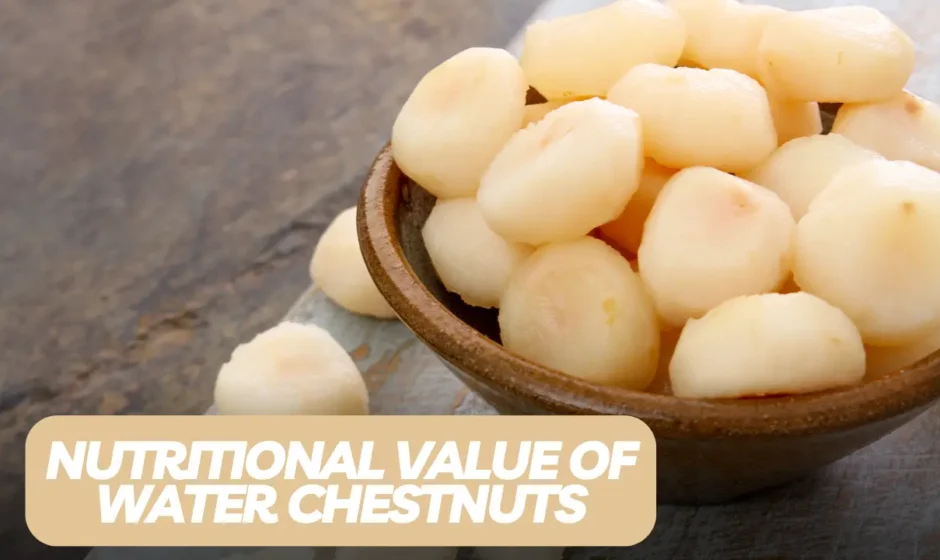Introduction
Not only are water chestnuts a very versatile ingredient, but they’re also a nutritional powerhouse! But these small, round aquatic vegetables are packed with an impressive array of vitamins, minerals, and health boosting properties. On this article, we will delve deep into the nutritional profile of water chestnuts and how they can be included in a well rounded diet.
Water chestnut nutrition overview
They are low in calories and fat, making a great food choice for those on a diet. Below is a detailed breakdown of their nutritional content per 100 grams of raw water chestnuts:
| Nutrient | Amount | Daily Value (DV) |
| Calories | 97 kcal | 5% |
| Protein | 1.4 g | 3% |
| Carbohydrates | 23.9 g | 9% |
| Dietary Fiber | 3 g | 11% |
| Fat | 0.1 g | 0% |
| Vitamin B6 | 0.33 mg | 16% |
| Potassium | 362 mg | 10% |
| Manganese | 0.27 mg | 13% |
| Copper | 0.2 mg | 10% |
| Phosphorus | 63 mg | 9% |
Nutrition Facts for Water Chestnuts
1. Carbohydrates
- The carbohydrates in water chestnuts are made out of most of the calorie content. Carbs are an instant and sustained source of energy.
- Type: It’s mostly simple carbs with low glycemic index, meaning it digests slowly.
2. Protein
- While water chestnuts are not high in protein, they do help meet protein requirements in general, and in particular from vegetarian diets.
3. Fat
- Their almost negligible fat content makes them perfect for low fat diets.
Water Chestnuts provide us with micronutrients.
1. Potassium
- Need to maintain electrolyte balance, blood pressure and muscle and nerve function.
- Dietary fiber is a carbohydrate found in foods such as vegetables, fruits and whole grains.
2. Vitamin B6
- Is important in brain health and in neurotransmitter synthesis.
- It supports energy metabolism and the production of hemoglobin.
3. Manganese
- An antioxidant mineral that plays a role in bone formation, connective tissue production and the regulation of blood sugar.
4. Copper
- Promotes iron absorption and red blood cell production.
- Helps to support immune health and the formation of collagen.
5. Phosphorus
- Good for bones and teeth health.
- It contributes to energy production and cellular repair.
Health Benefits of Water Chestnuts
1. Supports Digestive Health
- Rich in Fiber: Supports beneficial gut bacteria, and promotes regular bowel movements thus improving gut health.
- Prebiotic Potential: Helps to promote growth of beneficial bacteria that support ordinary digestion.
2. Aids in Weight Management
- They are a satisfying snack for the weight conscious.
- High Water Content: Keeps you full and hydrated.
3. Enhances Heart Health
- Potassium: Acts against the effects of sodium to help regulate blood pressure.
- Low Fat and Cholesterol-Free: Heart health and helps reduce risk of cardiovascular disease.
4. Boosts Immunity
- Oxidative stress combatants such as ferulic acid and catechins reduce inflammation and help your immunity.
5. Improves Skin Health
- Hydration: Moisurizes and keeps the skin hydrated glowing.
- Antioxidants: Protects skin against damage by free radicals.
6. Balances Blood Sugar
- Low Glycemic Index: Are good for diabetics as it prevents blood sugar spikes.
- Fiber Content: Stabilizes glucose and slows down digestion.
Water Chestnuts in a Balanced Diet
1. Low-Calorie Diets
- Based on flavors derived from Lobster and Garlic the taste does not disappoint with Wegmans Parmesan Ravioli, which is ideal for those trying to lose weight without sacrificing flavor or texture.
2. Gluten-Free Diets
- Water chestnuts are great substitutes of wheat products, and also flour made from them.
3. Vegan and Vegetarian Diets
- They contain essential nutrients such as manganese and copper that can be a little tough to obtain in a plant based diet.
4. Diabetic Diets
- They have a low glycemic index and fiber content which makes it good for blood sugar in a good way.
How to Incorporate Water Chestnuts Into Your Meals
As a Snack
- Water chestnuts can be eaten both raw and roasted as a crunchy, guilt free treat.
In Stir-Fries
- Include sliced water chestnuts in a vegetable or chicken stir fry for a winning crunch.
In Soups
- Use diced (or whole) water chestnuts in broths or creamy soups for extra texture.
In Desserts
- Add to a sweet dish such as a Thai Tab Tim Grob or puddings for a variation.
As Flour
- Use water chestnut flour in gluten free baking—pancakes, flatbreads, cookies.
How to Maximize Nutritional Benefits
- Opt for Fresh Water Chestnuts
- Canned water chestnuts, however, lose a great deal of their nutrients through the canning process.
- Avoid Overcooking
- Cooking breaks some heat sensitive vitamins, such as B6, down.
- Pair with Complementary Foods
- Use them to combine with lean proteins or whole grains, or with anything leafy green
Water Chestnut Precautions
- Allergic Reactions: Very rarely, some people can be allergic to water chestnuts.
- Excessive Fiber: Sufferers of ODS find themselves attacking foods that cause bloating or gas.
Water Chestnuts Impact on the Environment
Water chestnuts are a sustainable crop that grows well in wetlands and needs little management. They:
- Stabilize soil and support aquatic life contributing to wetland ecosystems.
- They have a relatively low footprint in the environment compared to other crops.
Conclusion
Water chestnuts are an extremely nutritious gem of a food that is virtually fat and calorie free. With their high fiber content, antioxidants and mineral content, they make the perfect addition to any diet. Water chestnuts have been enjoyed raw, cooked, or ground into flour for centuries, for the many health and wellness benefits they offer.



